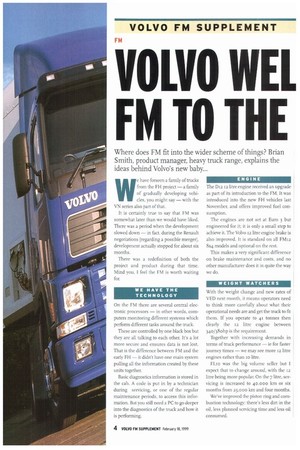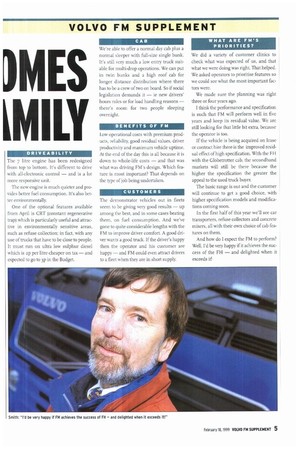VOLVO WEL Frol TO THE )MES iMILY
Page 104

Page 105

If you've noticed an error in this article please click here to report it so we can fix it.
Where does FM fit into the wider scheme of things? Brian Smith, product manager, heavy truck range, explains the ideas behind Volvo's new baby...
We have forseen a family of trucks from the FH project — a family of gradually developing vehicles, you might say — with the VN series also part of that.
It is certainly true to say that FM was somewhat later than we would have liked. There was a period when the development slowed down — in fact, during the Renault negotiations [regarding a possible merger], development actually stopped for about six months.
There was a redefinition of both the project and product during that time. Mind you, I feel the FM is worth waiting for.
WE HAVE THE TECHNOLOGY
On the FM there are several central electronic processors — in other words, computers monitoring different systems which perform different tasks around the truck.
These are controlled by one black box but they are all talking to each other. It's a lot more secure and ensures data is not lost. That is the difference between FM and the early FH — it didn't have one main system pulling all the information created by these units together.
Basic diagnostics information is stored in the cab. A code is put in by a technician during servicing, or one of the regular maintenance periods, to access this information. But you still need a PC to go deeper into the diagnostics of the truck and how it is performing.
ENGINE
The I:112 12 litre engine received an upgrade as part of its introduction to the FM. It was introduced into the new FH vehicles last November, and offers improved fuel consumption.
The engines are not set at Euro 3 but engineered for it; it is only a small step to achieve it. The Volvo 12 litre engine brake is also improved. It is standard on all FM12 8x4 models and optional on the rest.
This makes a very significant difference on brake maintenance and costs, and no other manufacturer does it in quite the way we do.
WEIGHT WATCHERS
With the weight change and new rates of VED next month, it means operators need to think more carefully about what their operational needs are and get the truck to fit them. If you operate to 41 tonnes then clearly the 12 litre engine between 340/380hp is the requirement.
Together with increasing demands in terms of truck performance — ie for faster journey times — we may see more 12 litre engines rather than ro litre.
FLro was the big volume seller but I expect that to change around, with the 12 litre being more popular. On the 7 litre, servicing is increased to 40,000 km or six months from 25,000 km and four months.
We've improved the piston ring and combustion technology: there's less dirt in the oil, less planned servicing time and less oil consumed.
DRIVEABILITY
The 7 litre engine has been redesigned from top to bottom. It's different to drive with all-electronic control — and is a lot more responsive unit.
The new engine is much quieter and provides better fuel consumption. It's also better environmentally.
One of the optional features available from April is CRT (constant regenerative trap) which is particularly useful and attractive in environmentally sensitive areas, such as refuse collection; in fact, with any use of trucks that have to be close to people. It must run on ultra low sulphur diesel which is zp per litre cheaper on tax — and expected to go to 3p in the Budget.
CAB
We're able to offer a normal day cab plus a normal sleeper with full-size single bunk. It's still very much a low entry truck suitable for multi-drop operations. We can put in twin bunks and a high roof cab for longer distance distribution where there has to be a crew of two on board. So if social legislation demands it — ie new drivers' hours rules or for load handling reasons — there's room for two people sleeping overnight.
BENEFITS OF FM
Low operational costs with premium products, reliability, good residual values, driver productivity and maximum vehicle uptime. At the end of the day this is all because it is down to whole-life costs — and that was what was driving FM's design. Which feature is most important? That depends on the type of job being undertaken.
CUSTOMERS
The demonstrator vehicles out in fleets seem to be giving very good results — up among the best, and in some cases beating them, on fuel consumption. And we've gone to quite considerable lengths with the FM to improve driver comfort. A good driver wants a good truck. If the driver's happy then the operator and his customer are happy — and FM could even attract drivers to a fleet when they are in short supply.
WHAT ARE FM'S PRIORITIES?
We did a variety of customer clinics to check what was expected of us, and that what we were doing was right. That helped. We asked operators to prioritise features so we could see what the most important factors were.
We made sure the planning was right three or four years ago.
I think the performance and specification is such that FM will perform well in five years and keep its residual value. We are still looking for that little bit extra, because the operator is too.
If the vehicle is being acquired on lease or contract hire there is the improved residual effect of high specification. With the FH with the Globetrotter cab, the secondhand markets will still be there because the higher the specification the greater the appeal to the used truck buyer.
The basic range is out and the customer will continue to get a good choice, with higher specification models and modifications coming soon.
In the first half of this year we'll see car transporters, refuse collectors and concrete mixers, all with their own choice of cab features on them.
And how do I expect the FM to perform? Well, I'd be very happy Wit achieves the success of the FH — and delighted when it exceeds it!
















































































































